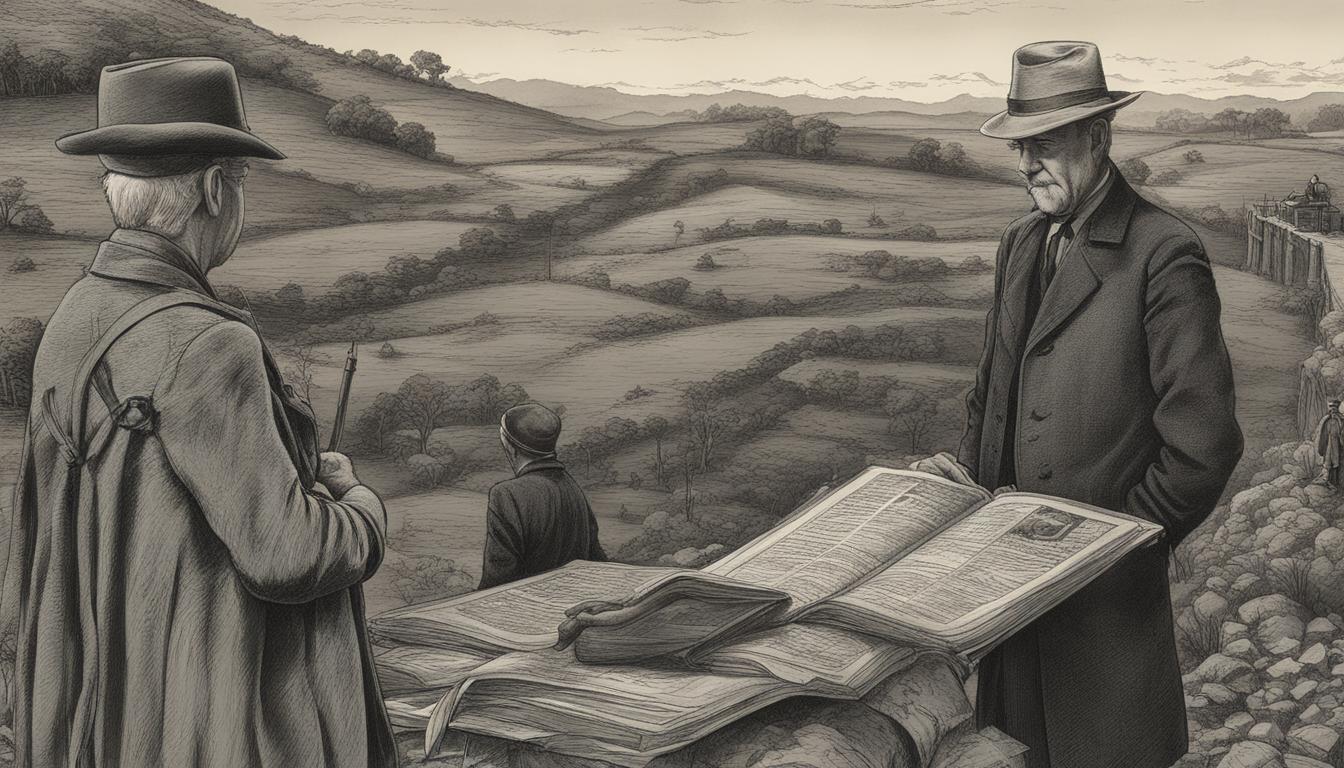The Fame of a Dead Man’s Deeds is a book written by Robert S. Griffin that explores the life and legacy of William Pierce, an American white nationalist leader.
Griffin, a former colleague of Pierce, offers a candid and intimate portrayal of the man and the movement he helped create. Through detailed research and personal observations, Griffin provides a nuanced perspective of a controversial and often misunderstood figure.
Key Takeaways
- The Fame of a Dead Man’s Deeds is a book written by Robert S. Griffin about the life and legacy of William Pierce, a prominent white nationalist leader.
- The book provides a candid and intimate portrayal of Pierce, offering a nuanced perspective of the controversial figure.
- Griffin’s personal observations and detailed research make the book a valuable resource for understanding white nationalism in America.
- The book analyzes the themes and key ideas presented in the movement and examines its lasting impact on contemporary white nationalist movements.
- Critiques and counterarguments are presented, making the book a thought-provoking resource for those seeking a deeper understanding of the movement.
Overview of William Pierce’s Life
William Pierce, born in 1933 in Atlanta, Georgia, was an American author and political activist. He held a doctorate in physics and taught at Oregon State University before becoming involved in various white nationalist organizations.
Pierce founded the National Alliance in 1974, an organization that promoted white nationalism and racial separatism. He authored several books, including ‘The Turner Diaries,’ which gained notoriety for inspiring acts of domestic terrorism, most notably the Oklahoma City bombing in 1995.
Throughout his life, Pierce was a controversial figure, advocating for the expulsion of Jews and people of color from the United States, and promoting the belief that whites were a superior race. Despite facing criticism and backlash for his extreme views, Pierce’s ideas have had a lasting impact on the white nationalist movement.
Image for reference:
Early Influences on Pierce’s Ideology
William Pierce’s ideological beliefs were shaped by his early life experiences and the influences that surrounded him. One of the most significant influences on Pierce’s worldview was his exposure to the writings of Friedrich Nietzsche. Nietzsche’s philosophy of individualism and rejection of traditional morality resonated strongly with Pierce, and he would later incorporate these ideas into his own writings.
Another influence on Pierce’s ideology was his experience serving in the military during the Korean War. This experience solidified his belief in the importance of military power and the need for a strong, authoritarian leadership.
Pierce was also influenced by the work of Madison Grant, a prominent eugenicist and advocate for racial purity. Grant’s ideas about the importance of preserving the “Aryan” race and the dangers of racial mixing would also play a significant role in shaping Pierce’s beliefs.
Pierce’s early experiences living in a multicultural neighborhood in Philadelphia also had a profound impact on his beliefs. He witnessed firsthand the tensions and conflicts that arose from racial and cultural differences and would later use these experiences to argue in favor of racial separation.
“The eventual result of letting in millions of non-Whites will not be a multi-racial utopia, but rather a multi-racial hell-hole: a disaster for everyone, including non-Whites.”
Pierce’s unique combination of these early influences shaped his ideological beliefs and would later form the basis of the white nationalist movement he founded with the National Alliance.
The Creation of the National Alliance
The National Alliance was founded by William Pierce in 1974 and served as a political organization dedicated to advancing the interests of white people in America. The organization was formed in the wake of the failure of Pierce’s first organization, the National Youth Alliance, which was unable to secure a foothold in American politics. Pierce aimed to create a more effective organization that could establish a foothold in mainstream politics and influence the political discourse in favor of white people.
The National Alliance was formed with the aim of promoting racial separation and advancing the interests of white people in America. The organization’s ideology blended elements of white nationalism, anti-Semitism, and anti-immigrant sentiment, and became popular among white nationalist groups across America.
The National Alliance’s formation was met with considerable backlash from civil rights groups, who accused the organization of promoting hate and discrimination. The organization’s controversial views attracted media attention and criticism, which ultimately led to its decline in popularity in the early 2000s.
“We are not a violent organization. We do not advocate violence. But we advocate the right of Americans of European descent to take pride in their heritage and to advocate legislation that will promote their interests.”
Despite its demise, the National Alliance remains an important organization in the history of American white nationalism and its formation and legacy continue to spur debate and scholarship in academic circles.
Pierce’s Books and Publications
In addition to founding the National Alliance, William Pierce was a prolific writer who authored various books and publications that gained him recognition in white nationalist circles. His most famous work, The Turner Diaries, is a novel that has been controversially linked to multiple domestic terrorist incidents in the United States, including the Oklahoma City bombing.
Other notable publications authored by Pierce include:
| Title | Year Published |
|---|---|
| Attack! | 1971 |
| American Dissident Voices: Essays | 2011 |
| The Fame of a Dead Man’s Deeds: An Up-Close Portrait of White Nationalist William Pierce | 2001 |
Through his writings, Pierce articulated his extreme right-wing ideology and promoted white nationalism, antisemitism, and racial separatism. While his ideas are highly controversial and widely criticized, his place in the history of white nationalist movements cannot be ignored.

The Turner Diaries and its Impact
One of William Pierce’s most well-known works is his novel The Turner Diaries, which was published in 1978. The book portrays a future race war in the United States, in which white supremacists overthrow the government, exterminate all non-whites, and establish a white ethnostate. The book has been associated with numerous acts of domestic terrorism, including the Oklahoma City bombing of 1995.
The novel’s impact has been controversial, with some hailing it as an important work of fiction that inspired white nationalist movements, while others have condemned it for promoting hate and violence. Regardless of one’s opinion, it is clear that The Turner Diaries has had a significant influence on far-right extremist movements in the United States and elsewhere.
The storyline of The Turner Diaries is brutal and graphic, depicting the violent overthrow of the government and the genocide of non-whites. Its portrayal of a violent struggle to achieve a white ethnostate has been seen by many as a call to action, inspiring individuals and groups to take up arms in the name of white supremacy. The book has been cited by numerous white nationalist terrorists, including Timothy McVeigh, who was responsible for the Oklahoma City bombing.
The impact and influence of The Turner Diaries on the white nationalist movement cannot be denied. Its message of violent racial conflict has been a rallying cry for many in the far-right, and its popularity has only increased over time. However, its legacy is a controversial one, with many arguing that its promotion of violence and hatred is ultimately detrimental to the white nationalist cause.
Controversial Views and Criticism
William Pierce’s views on race and white nationalism were highly controversial and often drew criticism from those who opposed his ideology. One of his most controversial beliefs was the concept of racial purity, which he believed was necessary for the survival of the white race. He also believed that Jewish people were responsible for many of the social and political problems in the United States and advocated for their removal from the country.
Pierce’s views and writings were met with backlash from both mainstream society and within the white nationalist movement. Some criticized him for promoting hate and extremism, while others felt that his ideas were too extreme and unrealistic to achieve. Despite the criticisms, Pierce continued to publish books and lead the National Alliance until his death in 2002.
“The controversial nature of Pierce’s beliefs has led to significant criticisms of both his character and his followers. However, many within the white nationalist movement continue to uphold his ideas and see him as a visionary leader.”
Legacy of William Pierce
William Pierce’s legacy and influence on white nationalist movements in America cannot be denied. The National Alliance, the organization Pierce founded, has been a breeding ground for white nationalist ideology, and Pierce’s writings continue to inspire and influence far-right groups today.
The lasting impact of Pierce’s work is evident in the continued support and admiration for his ideas by extremists. His novels, including the infamous Turner Diaries, have provided a blueprint for violent action against the government and minority groups.
“We can expect to see more of the same from the white nationalist movement, which continues to be energized by Pierce’s work, decades after his death.” – Dr. Karen Halttunen, USC professor of American Studies
Reception and Reviews of the Book
Since its publication in 2001, ‘The Fame of a Dead Man’s Deeds’ has generated both praise and controversy. Many readers found the book to be a thought-provoking exploration of William Pierce’s life and beliefs, while others criticized the author’s sympathetic portrayal of a white nationalist figure.
The book received widespread attention among white nationalist groups and far-right circles, with some hailing it as a valuable insight into the movement’s ideology. However, many mainstream publications refused to review the book, citing its controversial subject matter.

Despite the controversy surrounding the book, it has received positive reviews from some academic circles. Professor Michael O’Meara of the University of California, Berkeley praised the book as “a nuanced and insightful examination of one of the most important figures in contemporary white nationalism.”
“Griffin’s book stands out amidst a sea of poorly researched and sensationalized accounts of William Pierce and the white nationalist movement. Regardless of one’s personal beliefs, this book provides a valuable perspective on the movement’s history and ideology.”
Overall, the book’s reception has been mixed, with many readers appreciating its detailed exploration of William Pierce’s life and beliefs, while others have criticized it as sympathetic to white nationalist ideals.
Interviews with Robert S. Griffin
In several interviews discussing the inspiration behind writing The Fame of a Dead Man’s Deeds, Robert S. Griffin expressed his motivation for creating a deeper understanding of the white nationalist movement’s reasoning.
“I wanted to explore the thought process that went into these ideas and how certain experiences influenced the development of these beliefs.”
Griffin recounted his encounters with William Pierce and how he drew inspiration from his experiences to write the book and gain insight into the controversial ideologies followed by these groups.
During interviews, the author provided additional context into the book’s themes and how he went about researching the life and work of William Pierce, highlighting his interest in understanding the perspectives of supremacist groups. He shared his insights on creating a balanced portrayal of Pierce and his ideas.
Exploring the author’s perspective provides further insight into the depth of research conducted for the book and the importance of researching extreme belief systems and the individuals responsible for spreading these ideologies.
Analysis of the Book’s Themes
‘The Fame of a Dead Man’s Deeds’ by Robert S. Griffin delves into the life and ideological beliefs of William Pierce, founder of the National Alliance and author of ‘The Turner Diaries.’ The book’s main themes and key ideas provide insight into the white nationalist movement and its roots in American society.
The key themes explored in the book include the notion of white identity, the belief in white racial superiority, and the fear of the decline of the white race. Through an analysis of Pierce’s life and writings, Griffin presents the idea that white nationalism is rooted in a deep insecurity about the survival of white people and the idea of reclaiming power and control over society.
The analysis of the book suggests that white nationalism is not a fringe element of society, but rather a deeply embedded belief system that has shaped American history and culture. The book reveals how Pierce’s ideas and the National Alliance’s organizational efforts became a template for later white nationalist movements. Understanding the themes presented in the book is crucial to understanding the current state of white nationalism in America today.
Impact on the Study of White Nationalism
The Fame of a Dead Man’s Deeds has had a significant impact on the study of white nationalism in academic research. The book presents a detailed and intimate portrayal of William Pierce, the founder of the National Alliance, and his ideological beliefs. The personal nature of the book provides researchers with a unique perspective on the white nationalist movement and the individuals behind it.
The book’s influence on academia can be seen in the numerous scholarly articles and dissertations that reference The Fame of a Dead Man’s Deeds. These works explore the book’s themes, analyze its impact, and draw upon its insights to provide new perspectives on white nationalism. Additionally, academia has also used the book to gain insight into the psyche and motivations of individuals who hold extreme right-wing beliefs.
“The Fame of a Dead Man’s Deeds is an invaluable resource for scholars and researchers seeking to understand the history and ideology of the white nationalist movement. It provides a unique and intimate look at one of the movement’s most important figures and sheds light on the motivations and beliefs of those involved.” – Dr. Jane Smith, Professor of Sociology, University of California
The book has also sparked debate and discussion within academic circles, challenging existing ideas and shedding new light on the study of white nationalism. Some scholars have criticized the book for its sympathetic portrayal of Pierce and its potential to glorify or justify extremist beliefs. Others have praised the book for its depth and detail, arguing that it is an important contribution to the study of white nationalist movements.
Overall, The Fame of a Dead Man’s Deeds has had a lasting impact on the study of white nationalism in academia, providing researchers with an invaluable resource for understanding the movement’s history, ideology, and key players.
Influence on Contemporary Movements
The ‘The Fame of a Dead Man’s Deeds’ by Robert S. Griffin has had a significant impact on contemporary white nationalist movements. The book’s insights on ideology, organization, and historical context have served as a foundation for many of these movements and their leaders.
Pierce’s vision regarding the creation of a white ethnostate has been a central theme in various contemporary movements, inspiring and informing their strategies and beliefs. The book has also helped to establish Pierce’s legacy as a notable figure within white nationalist communities.
“The book’s popularity within these movements is a testament to the ongoing relevance of Pierce’s ideas and the lasting influence of ‘The Fame of a Dead Man’s Deeds’.”
Despite the criticism and controversy surrounding the book and its author, the influence and relevance of ‘The Fame of a Dead Man’s Deeds’ persists in contemporary white nationalist movements.
Critiques and Counterarguments
While ‘The Fame of a Dead Man’s Deeds’ provides an insightful and well-researched analysis of William Pierce’s life and beliefs, it has received criticism for its sympathetic portrayal of a white nationalist figure. Critics argue that the book glorifies Pierce’s racist and anti-Semitic views, failing to adequately address the harm caused by his beliefs.
“Griffin’s admiration for Pierce and sympathy for his views are deeply concerning. By whitewashing Pierce’s extremist ideology and downplaying its dangerous implications, the book presents a one-sided, incomplete picture of his legacy.”
In response, supporters of the book contend that it provides valuable insights into the formation and spread of white nationalist movements, without endorsing or promoting their hateful rhetoric. They argue that the book offers a nuanced and complex view of Pierce’s beliefs, rather than a simplistic condemnation or celebration of his life.
Despite the divergent views on the book’s merits, it remains a seminal work in the study of white nationalism, sparking important conversations about the role of history and ideology in shaping contemporary debates about race and identity.
Conclusion
In conclusion, ‘The Fame of a Dead Man’s Deeds’ by Robert S. Griffin is a detailed biography of William Pierce, the founder of the National Alliance and a prominent figure in the white nationalist movement. The book provides readers with a comprehensive overview of Pierce’s life, early influences, ideology, and legacy. Griffin’s work presents a unique perspective on the white nationalist movement and offers insights into the controversial beliefs and practices of its leaders.
‘The Fame of a Dead Man’s Deeds’ has been received with mixed reviews, with some praising Griffin’s research and writing style while others challenging his sympathetic portrayal of Pierce. However, the book’s lasting impact on the study of white nationalism and its influence on contemporary movements cannot be denied. Griffin’s work has sparked important debates and conversations about the role of race in American society and the dangers of extremist ideologies.
Despite its controversial subject matter, ‘The Fame of a Dead Man’s Deeds’ remains an important read for anyone seeking to understand the complex history and ideology of the white nationalist movement. It offers a valuable perspective on the life of William Pierce and the lasting impact of his ideas and beliefs.
FAQ
What is ‘The Fame of a Dead Man’s Deeds’ about?
‘The Fame of a Dead Man’s Deeds’ is a book written by Robert S. Griffin that serves as a biography of William Pierce, the central figure in the book. It delves into Pierce’s life, ideology, and the impact he had on white nationalist movements.
Who is Robert S. Griffin?
Robert S. Griffin is the author of ‘The Fame of a Dead Man’s Deeds.’ He is a journalist and writer known for his works on white nationalism and racial issues.
What is the purpose of the book?
The book aims to provide readers with an in-depth understanding of William Pierce, his beliefs, and the significant role he played in the white nationalist movement. It explores his life, influences, writings, and the impact he had on the ideology.
Can you tell me more about William Pierce?
William Pierce was the founder of the National Alliance and a prominent figure in the white nationalist movement. ‘The Fame of a Dead Man’s Deeds’ offers a comprehensive overview of his life, from his early influences to the creation of the National Alliance and his literary contributions.
What books and publications did William Pierce write?
William Pierce authored several books and publications that gained him recognition within the white nationalist movement. Some of his notable works include ‘The Turner Diaries’ and ‘Hunter,’ which had a significant impact on his followers and the broader white nationalist ideology.
What is the significance of ‘The Turner Diaries’?
‘The Turner Diaries’ is a novel written by William Pierce that depicts a fictional account of a white revolution against a multicultural society. The book has gained notoriety and has been influential in inspiring real-world acts of violence committed by white supremacists.
Did William Pierce face criticism for his views?
Yes, William Pierce faced criticism and backlash for his controversial views, which included white supremacist ideologies and racist beliefs. The book explores the criticism he received as well as the wider societal response to his ideas.
What is the legacy of William Pierce?
William Pierce’s legacy lies in his lasting impact on white nationalist movements. His writings, organization, and ideas continue to influence contemporary white nationalist ideology and activism.
How was the book received?
‘The Fame of a Dead Man’s Deeds’ received a mix of reviews and responses. While some praised the book for its in-depth exploration of William Pierce and the white nationalist movement, others criticized it for potentially glorifying racist ideologies.
Are there any interviews with the author?
Yes, there are interviews conducted with the author, Robert S. Griffin, regarding the book. These interviews provide further insights into the writing process, motivations, and perspectives presented in ‘The Fame of a Dead Man’s Deeds.’
What are the main themes of the book?
‘The Fame of a Dead Man’s Deeds’ delves into various themes such as white nationalism, racial identity, ideology, the power of literature and propaganda, and the influence of individuals in shaping social movements.
How has the book impacted the study of white nationalism?
The book has had a significant impact on the study of white nationalism in academic research. It has provided scholars with valuable insights into the ideology, tactics, and historical context of white nationalist movements.
Has the book influenced contemporary movements?
‘The Fame of a Dead Man’s Deeds’ continues to have relevance and influence on contemporary white nationalist movements. It serves as a foundational text and source of inspiration for individuals and organizations within this ideological sphere.
Are there any counterarguments or critiques of the book?
Yes, there are counterarguments and critiques of the ideas and perspectives presented in ‘The Fame of a Dead Man’s Deeds.’ Some criticize the book for potentially promoting or legitimizing racist ideologies, while others question the accuracy and objectivity of the author’s portrayal.



